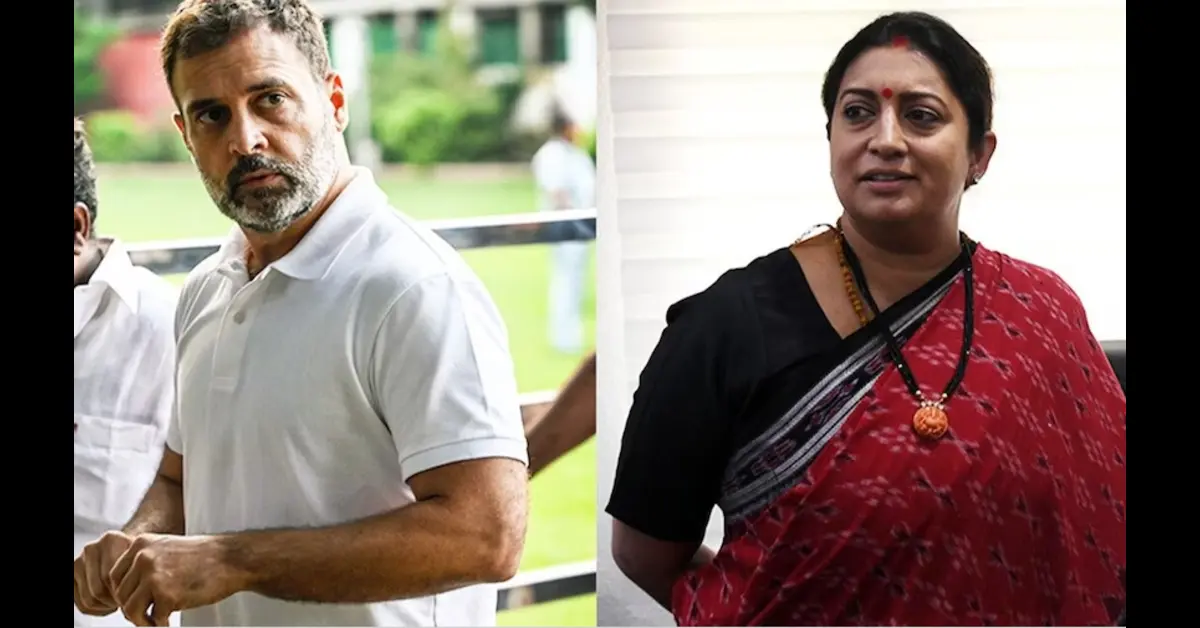Table of Contents
In a notable and somewhat unexpected move, Rahul Gandhi, a prominent leader of the Indian National Congress, came to the defense of Smriti Irani, a key figure in the Bharatiya Janata Party. Gandhi’s appeal to stop the personal attacks on Irani underscores a broader message about political discourse and personal conduct.
The Incident: Rahul Gandhi Defends Smriti Irani
Context and Background
The Indian political landscape is often characterized by fierce debates and, at times, harsh personal attacks. Recently, Smriti Irani has been the target of such attacks, drawing both public and political criticism. In this charged atmosphere, Rahul Gandhi’s defense of Irani marks a significant call for civility and respect.
Rahul Gandhi’s Statement
Rahul Gandhi’s statement, “Insulting people is a sign of weakness,” resonates deeply in a society increasingly polarized by political and ideological differences. He emphasized the importance of maintaining dignity and respect in political discourse, regardless of party affiliations.
A Call for Respectful Dialogue
Gandhi’s message extends beyond the immediate context of defending Irani. He advocates for a more respectful and constructive dialogue, urging individuals and political entities to focus on substantive issues rather than resorting to personal attacks. This appeal is timely and necessary, given the current state of public discourse.
The Broader Implications of Gandhi’s Statement
Political Decency and Civility
In defending Smriti Irani, Rahul Gandhi highlights a fundamental principle of political engagement: the need for decency and civility. Politics, he suggests, should be a platform for the exchange of ideas and policies, not a battleground for personal insults and vendettas.
The Impact on Public Discourse
Gandhi’s stance has the potential to influence public discourse positively. By setting an example of defending an opponent, he encourages others to adopt a similar approach, fostering a culture of mutual respect. This shift can lead to more meaningful and productive political debates.
Building a More Inclusive Political Environment
A commitment to respectful dialogue and civility can also contribute to a more inclusive political environment. When leaders model respectful behavior, it sets a standard for their followers and the broader public, promoting a healthier and more inclusive political culture.
Insights into Rahul Gandhi’s Leadership Style
A Leadership Based on Principles
Rahul Gandhi’s defense of Smriti Irani and his call for respectful discourse reflect a leadership style grounded in principles and values. By prioritizing respect and dignity, he demonstrates a commitment to ethical leadership.
Promoting Unity Amidst Diversity
In a diverse and pluralistic society like India, Gandhi’s message is particularly relevant. It underscores the need for unity and cooperation across political and ideological divides, fostering a spirit of collaboration and mutual respect.
Challenges and Opportunities
While Gandhi’s stance is commendable, it also presents challenges. In a highly polarized political environment, advocating for civility can be difficult. However, it also offers an opportunity to lead by example and inspire others to follow suit.
Responses and Reactions
Political Reactions
Gandhi’s defense of Irani has elicited varied responses from the political spectrum. Some have praised his call for civility, while others remain skeptical of its impact. Regardless of the reactions, the statement has sparked important discussions about the nature of political discourse.
Public Reactions
Among the public, Gandhi’s message has resonated with many who are tired of the negativity in politics. His appeal for respect and decency aligns with a growing desire for more constructive and positive engagement in public life.
The Role of Media and Public Figures
Media’s Responsibility
The media plays a crucial role in shaping public discourse. By highlighting and promoting respectful dialogue, media outlets can contribute to a more positive political environment. This includes holding public figures accountable for their language and behavior.
Public Figures Leading by Example
Public figures, including politicians, celebrities, and influencers, have a responsibility to model respectful behavior. By doing so, they can set a tone that discourages personal attacks and promotes constructive dialogue.
Conclusion: A Call to Action
Rahul Gandhi’s defense of Smriti Irani and his broader message about the nature of political discourse are timely reminders of the importance of respect and civility. As public figures and citizens, we all have a role to play in fostering a culture of mutual respect and constructive engagement.
By embracing Gandhi’s call to stop the nastiness and focus on respectful dialogue, we can contribute to a healthier, more inclusive, and more productive political environment. It’s a call to action that transcends political boundaries and speaks to our shared humanity.
Kejriwal Opposes Bail Plea, Alleges Witchhunt
Frequently Asked Questions
Why did Rahul Gandhi defend Smriti Irani?
Rahul Gandhi defended Smriti Irani to emphasize the importance of respect and civility in political discourse, urging people to stop personal attacks.
What was the context of Rahul Gandhi’s statement?
Gandhi’s statement came in response to ongoing personal attacks against Smriti Irani, advocating for a more respectful and constructive political dialogue.
How did the public react to Gandhi’s statement?
Many in the public appreciated Gandhi’s call for civility, resonating with those tired of negative and personal attacks in politics.
What impact could Gandhi’s statement have on political discourse?
Gandhi’s statement could encourage more respectful and constructive political debates, promoting a healthier and more inclusive political environment.
Why is respectful dialogue important in politics?
Respectful dialogue is crucial for productive political engagement, fostering mutual understanding, cooperation, and the exchange of ideas.
How can media and public figures promote respectful dialogue?
Media can highlight and encourage respectful behavior, while public figures can lead by example, setting a tone that discourages personal attacks and promotes positive engagement.
